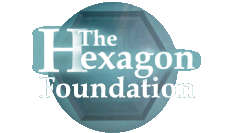|
c/o The Neovictorian/Cochlea In the poem The Hexagon, the reader is taken on a tour of a building situated at the center of a future city and dedicated to poetry. This imaginary building houses a library, a poets’ café, archives, classrooms, meeting-rooms and more; it embodies a view of Art as a record of the community’s experience and a source of wisdom for future generations. The Hexagon Foundation hopes soon to obtain recognition as a nonprofit foundation dedicated to the construction of the Hexagon in cities throughout the world. This is, clearly, an enormous undertaking. However, it is an undertaking that could be pursued in small steps, each of which would have value in itself. As a first step, a local group of poets might pursue the establishment of a reading room and archive for their works and those of any poet willing to join in their effort. They would advocate the inclusion of a provision for such an archive in the city and county ordinances (see draft of proposed ordinance below). To gather support for this project, they would seek contact with organizations and with individuals who share their desire that the community be guided by awareness and concern. They would meet periodically to report on their progress, using poetry as a tool of concise and thoughtful communication. They would constitute themselves as a local Council of Poets, establishing a constitution, setting membership requirements, and electing representatives in accordance with their commitment to the craft of poetry and the goals of the Hexagon Foundation.
DRAFT OF A CITY ORDINANCE WHEREAS the poetry being written in the city of [Name] constitutes an important record of the community’s life which should be handed down to further generations; WHEREAS a meeting place for poets can enable a thoughtful and tolerant exchange upon matters of current importance to the people of this city; and WHEREAS it is known that the work of important poets is not always recognized in their lifetime, and each generation should preserve as much as possible of the poetry being written in order to allow future generations the possibility of choosing: NOW THEREFORE there shall be and is hereby established a Reading Room and Archive for the poets of the city of [Name], to be known as the Hexagon Foundation, [Name] branch. 1) The city will support the said Reading Room and Archive at a cost of not less than (amount to be determined) per year, and the City of [Name] obligates itself to levy and collect an annual tax for the support and maintenance of such Reading Room and Archive of not less than (amount to be determined) per year. 2) The management of the archive and reading room shall be under the supervision of a Board appointed by the [Name of City] Council of Poets, subject to the approval of the Mayor and the City Council.
The hexagon was chosen as symbol of this foundation, in part because it is the cross-section of the cell constructed by the bee, which is an ancient symbol of both poetry and community. The hexagon is the largest polygon that will tile a plane. It is the figure produced by arranging six circles around a seventh; the circle, in turn, stands for the universe and the microcosm of the individual. Thus the hexagon can be a symbol of reconciliation and peace. ON THE PROPONENT OF THE "HEXAGON" IDEA: Esther Cameron, a long-time Madison resident, holds a Ph.D. in German from the University of California-Berkeley (dissertation subject: Paul Celan) and a J.D. from the University of Wisconsin Law School. From 1980-90 she worked in Jerusalem as a translator and editor. She has composed a blank verse epic, The Consciousness of Earth, and has published original poetry in English, Hebrew and German. From 1994-95 she edited the newsletter of Shaarei Shamayim, Madison’s Reconstructionist and Jewish Renewal Congregation, and was active in interfaith work; since 1995 she edits a poetry magazine, The Neovictorian/Cochlea.
All materials on this site©2002 by Esther Cameron, except for included works by other authors, who hold copyright to their own works.
|
